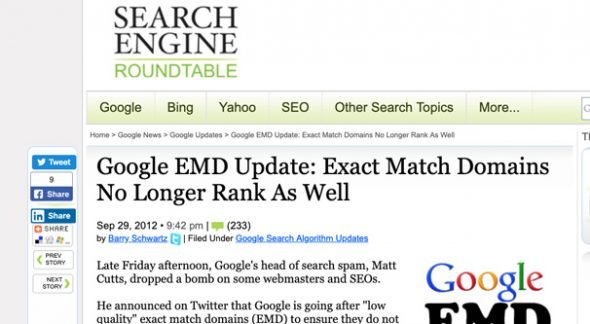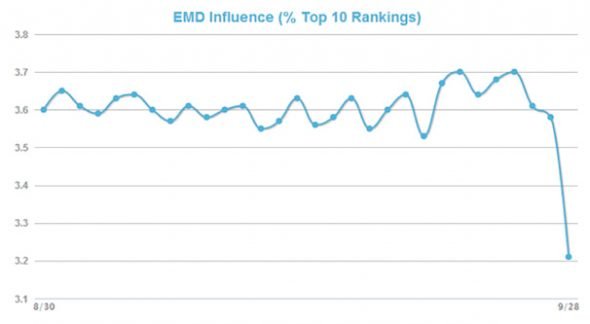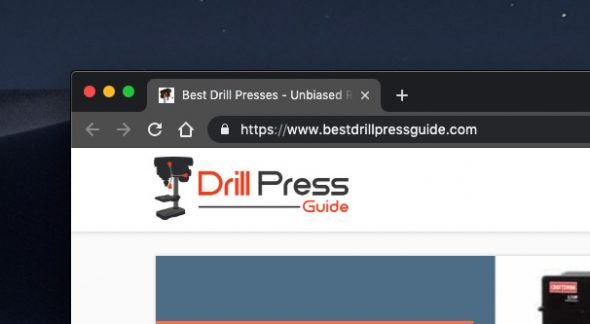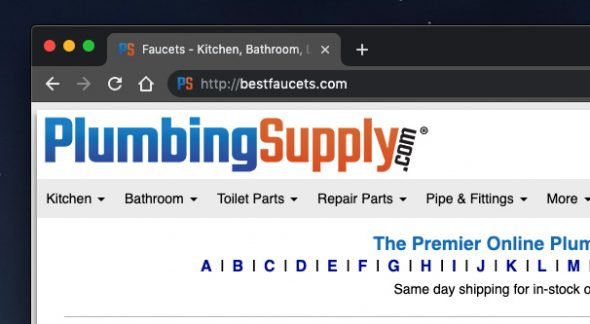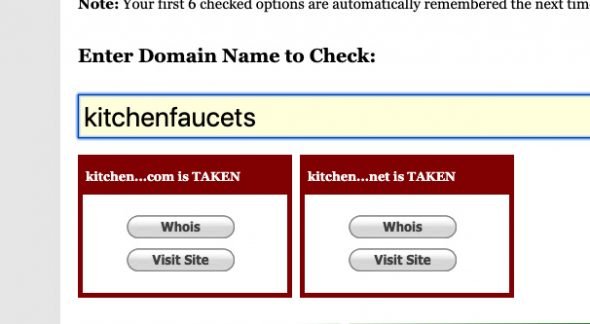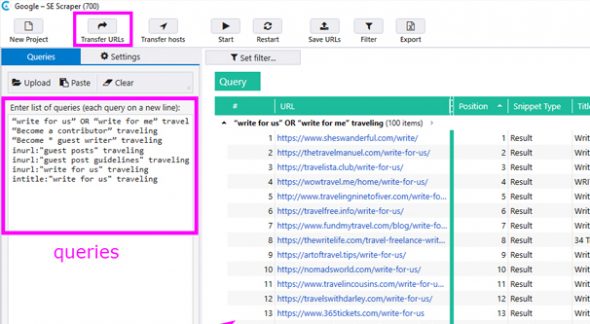Exact Match Domains, or EMDs, are a particular kind of domain name that have a one to one relationship with the primary keyword your business is trying to target. They have a long and questionable history, so where do they stand?
What Exactly is an Exact Match Domain?
Exact Match Domains, or keyword domains, are domain names that match keywords exactly. They were a huge SEO technique back in the early 2000s, and they were everywhere. Back when the internet was young, people would just try to use intuition to figure out what websites to go to. If you wanted to read about the best faucets, you might try to go to bestfaucets.com. If you wanted a marketing agency in Chicago, you’d go to chicagomarketingagency.com.
When search engines came around, they recognized the importance of keywords, and they recognized that a site with an exact match domain was probably relevant to that keyword. If someone in Chicago is looking for marketing, they would probably want to find Chicago Marketing Agency, right?
Search engines back then gave a pretty big boost to sites that had exact matching domains. This was back when the majority of Google searches were simple keyword strings, long-tail keywords were rare, and algorithms were fairly unsophisticated.
The problems started coming when business owners started abusing exact match domains. You might have one marketing agency out in California start buying up CityNameMarketingAgency.com for every city they could think of. All of those sites would be identical except for the changed name of the city, and all of them would direct customer inquiries back to their main California business.
Obviously, a user doesn’t want to see a bunch of identical pages in their search results, and if they’re looking up a local agency, they don’t want to find an agency just pretending to be local.
Since then, there have been a lot of changes to the way search engines work. For example:
- Search engines process a lot more long-tail keyword searches than they ever did before.
- Search engines process a lot more “natural voice” searches, such as questions asked of Siri or Google through voice-to-text, or people typing entire questions into the Google search bar.
- Exact match domains no longer exactly match the search queries users plug in.
- The abusive aspect of dozens of mirrored sites pointing at one centralized site are largely demoted to spam techniques.
Additionally, Google pushed a large algorithmic update in 2012 focusing entirely on Exact Match Domains. The value of an exact match domain dropped – see this chart – and it seemed that was that:
A few short months later – and indeed still, years later – it seems as though exact or partial match domains are still potent, though nowhere near as powerful as they were in the heyday in 2011. So what’s going on?
The Determining Factor: Quality
As with all things relating to Google and their search algorithm, the determining factor in the modern day is quality. Every single search engine factor – and there are a lot – comes down to quality.
The point that Google has been trying to make for years now is that it doesn’t matter what mechanical elements of your site are better than those of other sites, or worse; it matters how high quality the site content is.
Think about all of the factors that go into making a modern website rank.
- Site speed: This allows users to reach your quality content quickly, and slow sites present a roadblock to getting quality content quickly.
- Mobile compatibility: An increasing number of web users are browsing via mobile, so a mobile experience allows users to view your quality content without disruption or issues navigating.
- Lack of copied content: Your content can’t be high quality if it’s stolen from somewhere else.
- Keyword usage: Keyword spam is an indicate that a piece of content is not high quality, meanwhile high quality content focused around a keyword is much more likely to rank.
With Google, all roads go back to quality, and that includes keywords in the domain.
The problem that Google’s updates are trying to fight is the problem of low quality sites. More often than not, people would register an exact match domain and populate it with a couple of articles filled with keywords, and lace them with affiliate links or links back to their main money site.
When the exact match domain was a powerful search indicator, these sites were given a lot of value. Since users don’t like to find those sites, and those sites on their own were not actually valuable, Google determined that the best broad solution they could do was demote the utility of EMDs.
This did tend to hurt some sites with legitimate content on them, but that’s what the other algorithmic adjustments are for. 2011’s Panda update and all of the subsequent quality updates have forced websites to produce high quality content if they want to be ranked for any kind of web search at all.
Google’s slight rollback on demoting EMD value is further proof of this. What happened is that the initial punch drove away 90% of the sites that were only using EMDs to exploit the benefit of having them. Once this died down, Google was free to give the keyword in the domain a bit more of a boost, while making it heavily modified by the presence of high quality content.
What it comes down to today is that having an EMD will not immediately demote your site, but it does make the standards you need to live up to a little higher than if you had a branded domain.
The Benefits of Using an Exact Match Domain
Even today in 2019, seven years after the large exact match domain update that demoted thousands of sites, using an exact match domain is a potentially powerful benefit to your site SEO. Here are some of the benefits it can have:
An exact match domain tells Google and users exactly what your site is about. If your site is ChicagoMarketingAgency.com, Google and your users automatically know that your business is a Chicago-based marketing agency. Local users know you’re local, and global users might be able to take your location into consideration. This does, however, mean you need to actually live up to what your domain says you are. If you own ChicagoMarketingAgency.com, you can’t use it to promote your business that’s nowhere near Chicago.
An exact match domain is generally able to capture user attention easily. Hotels.com is a catchy brand name even though it’s an exact match domain because they’ve spent over two decades building up that brand. Other exact match domains are potentially able to capture user attention simply by being direct. If a user is looking for advice about faucets and they find BestFaucets.com, they know you’re likely going to have a lot of information about faucets.
That said, there are some drawbacks to choosing an exact match domain.
The Drawbacks to Using an Exact Match Domain
Using an EMD is not without risk. It’s not inherently destructive, but you have to consider some additional factors before deciding on such a domain.
Many of the best exact match domains are already taken. These days, it’s increasingly difficult to find powerful exact match domains. You’re increasingly looking at long-tail keywords for your exact match domains. This is a problem, because exact match domains are only valuable when the keyword they’re targeting is short, sweet, and high volume. The lower the search volume for the exact match keyword you’re targeting, the lower the value of the exact match domain for that keyword will be.
This has led to a lot of people trying to get exact match domains with a different TLD, like a .net or a .biz or a .company. We’ve covered this topic before; using non-standard TLDs is generally a bad idea. For one thing, you induce confusion about which is the site with the better value. It just makes your site look like a trashy ripoff, even if there’s no corresponding site on the .com and it’s just an expensive parked domain.
Speaking of, even if the EMD is a parked domain, that doesn’t mean you can pick it up. Many of the best EMDs that aren’t already in use have very high price tags attached to them. You might be looking at tens or hundreds of thousands of dollars for such domains.
Many users are no longer searching with specific keyword queries. The increase in people knowing how to use long-tail search results, combined with the increase in people using voice search and asking language-parsed questions, means that the number of queries using specific exact match domains is decreasing every year. This means the value of an exact match domain is lower than ever.
At the same time, Google has been implementing semantic search using broad dictionaries of synonyms. More and more, you can search for a specific, short query and not see a single result that matches the domain. Google can find good results that don’t have the same keyword in them, but have a similar keyword, and your EMD doesn’t help you show up in that list at all.
It’s very difficult to brand an exact match domain. Look at the site you’re reading now. Our exact match domain is Guestpost, but it’s not easy to brand. No one is going to see the keyword “guestpost” and immediately think of our brand, they’re going to think of the practice of guest posting.
Now, I can’t tell you whether or not having the EMD has been of a benefit to us over the years. Maybe it has, maybe not. I don’t have an identical site for comparison. What I do know is that it’s difficult to brand an exact match keyword. It’s difficult to trademark generic terms, if you can do it at all, and forming an online brand around a keyword is going to be impossible.
Periodic updates to the value of an exact match domain can hurt your site. Back in 2012, Google stated that the exact match domain update was not really a new change to the algorithm the way Panda was and the way other actual algorithm updates were. Instead, it was more like a filter. They went through their index, found every exact match domain they could, and reviewed it for content quality. Any site that didn’t make it was demoted. Over time, some recovered, and others died.
The thing is, Google said they would apply this filter again and again moving forward. It’s entirely possible that they’re still periodically applying that filter, and it can cause variations in your search engine rank as they audit your site for quality at any time. Of course, it’s hard to tell when a search variation is because of EMDs or from one of the other hundreds of factors, so that may not be as much of a risk as it seems.
You have to clear a higher bar for your content quality to avoid being filtered. You can think of using an exact match domain as a sort of “hard mode” for building a good website. You may get a slight boost to your search visibility because of the exact match domain, but the minimum standards for your content quality are higher than they are for other sites. It’s a greater risk for a greater possible reward, in a sense.
So, is having an exact match domain hurting your site? The answer is, probably not. If your site is struggling and you have an exact match domain, it’s probably not HELPING, but the actual problem is more likely the quality if your content, the speed of your site, or another more common factor. I’d recommend checking into those first.
 ContentPowered.com
ContentPowered.com

